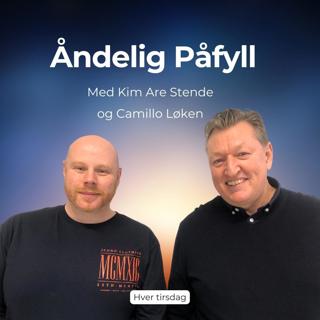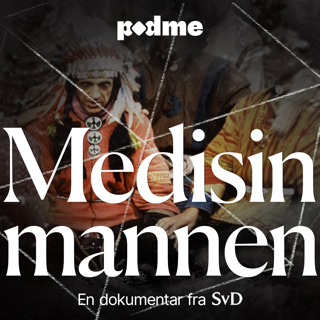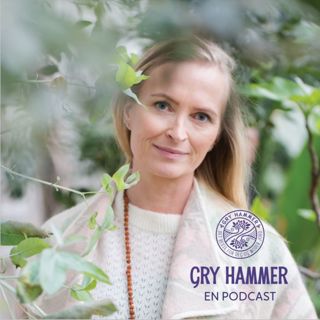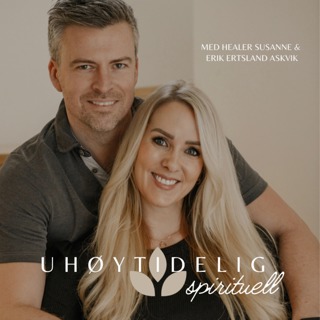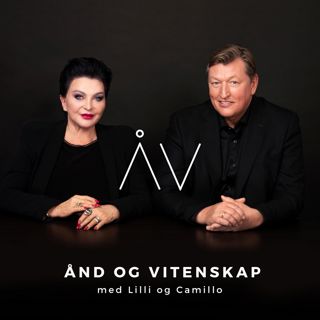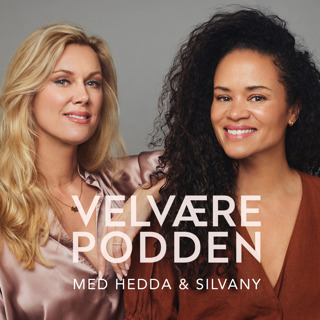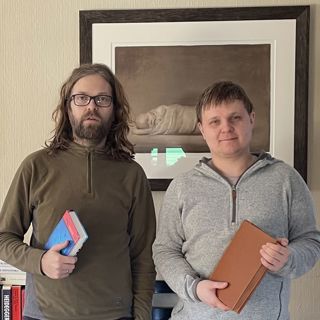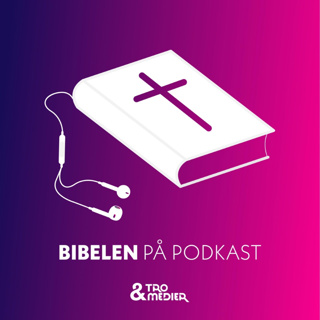![Rabbanit Rachelle Fraenkel: How Can God be Found After Trauma? [God 3/3]](https://cdn.podme.com/podcast-images/D79089FBEF78B78B9B1A2A8AFD27F6A1_small.jpg)
Rabbanit Rachelle Fraenkel: How Can God be Found After Trauma? [God 3/3]
In this episode of the 18Forty Podcast, we sit down with Rabbanit Rachelle Fraenkel—speaker, educator, and yoetzet halacha— about the effects of tragedy on emunah. In 2014, Rabbanit Rachelle Fraenkel’s son Naftali was kidnapped and murdered in a tragic terror attack. The week before the world learned of his fate was sad but hopeful, leaving many feeling crushed by the outcome. Despite this impossible situation, Rachelle was lauded as displaying emunah, faith, in Hashem, remaining optimistic but devoid of expectation. -How did or didn’t Rachelle’s tragedy impact her emunah in God?-What expectations can people have of God when they pray?-What expectations can people not have of themselves when they pray?-What should our relationship with God be during difficult times?-And how should we console those who are themselves going through difficult times?Tune in to hear Rachelle talk about emunah in the face of tragedy, and how one can blend optimism and realism. References:Yosl Rakover Talks to God by Zvi KolitzThe Blessing of a Broken Heart by Sherri MandellScholarly Mentions:Emmanuel LevinasFor more, visit https://18forty.org/topics/god.Rabbanit Rachelle Fraenkel is a teacher of Torah at Nishmat and the director of Matan’s Hilchata Institute. After her son Naftali was kidnapped and killed along with Gilad Sha’er and Eyal Yifrah in 2014, Rachelle became an international speaker and teacher. Rachelle speaks from the sharpest edges of human experience and her words are marked by a deep wisdom. Listen to Rachelle to hear from a profoundly learned and experienced teacher of Torah and life.Become a supporter of this podcast: https://www.spreaker.com/podcast/18forty-podcast--4344730/support.
23 Feb 20211h 22min
![Dr. Aaron Segal: Can God Be Proven? [God 2/3]](https://cdn.podme.com/podcast-images/D79089FBEF78B78B9B1A2A8AFD27F6A1_small.jpg)
Dr. Aaron Segal: Can God Be Proven? [God 2/3]
In this episode of the 18Forty Podcast, we sit down with Dr. Aaron Segal, philosophy professor and student of both Rav Aharon Lichtenstein and Alvin Plantinga, to discuss God from the perspective of analytic philosophy. Analytic philosophy is mathematical, breaking claims into small pieces to rigorously analyze the language and concepts. The cost of this approach is its unwieldiness and high standards, which Aaron believes has precluded it from providing a capital-P proof of God’s existence. But one can still reason about God, and though some would claim belief in God is irrational, Aaron thinks its rationality is justified. -What are the approaches one can take to belief in God?-What are the limits of analytic philosophy in talking about God?-What are the limits of a philosophy like Plantinga’s reformed epistemology?-Can one’s knowledge of God be purely experiential?Tune in to hear Aaron talk about both the power and limits of reasoning applied to God.References:Tractatus Logico-Philosophicus by Ludwig WittgensteinKuzari by Yehuda HaLeviMetaphysics by Peter van InwagenAdvice to Christian Philosophers by Alvin PlantingaThe Source of Faith is Faith Itself by Rav Aharon Lichtenstein"The Source of Faith..." Examined by Aaron SegalKurt Godel's ontological argument - https://plato.stanford.edu/entries/ontological-arguments/#GodOntArgScholarly Mentions:Rav Aharon Lichtenstein, Alvin Plantinga, Kurt Godel, Bertrand Russel, Ludwig Wittgenstein, Yehuda HaLevi, David Hilbert, Immanuel Kant, David Chalmers, Georg Cantor, John Locke, David Hume, David Johnson (YU) For more, visit https://18forty.org/topics/god. Dr. Aaron Segal is a lecturer in the Department of Philosophy at the Hebrew University of Jerusalem, and formerly taught philosophy in Yeshiva University. Aaron received his doctorate from the University of Notre Dame, where Alvin Plantinga was one of his thesis directors. He has co-authored and co-edited books on Jewish philosophy, such as Jewish Philosophy in an Analytic Age. Aaron is masterful in his knowledge and comfort in the profound questions of analytic philosophy, and also received Semicha from the Chief Rabbinate in Israel.Become a supporter of this podcast: https://www.spreaker.com/podcast/18forty-podcast--4344730/support.
16 Feb 20211h 28min
![Rabbi David Aaron: How Should We Talk About God? [God 1/3]](https://cdn.podme.com/podcast-images/D79089FBEF78B78B9B1A2A8AFD27F6A1_small.jpg)
Rabbi David Aaron: How Should We Talk About God? [God 1/3]
In this episode of the 18Forty Podcast, we sit down with Rabbi David Aaron, author, thinker, and educator, to discuss what God is and isn’t. People often think of God as a powerful, heavenly figure giving commandments, but to Rabbi Aaron, God is more of an experience of awe or good that morally inspires. This experience is impacted by our past experiences, often most prominently by those involving our parents. Rabbi Aaron thinks that many atheists are truly believers and would connect to their faith through therapy, not philosophy. - What is and isn’t God?- What does it mean to believe in God, and what does it mean to be an atheist?- Why do people believe in God?- How does one find and experience God?Tune in to hear Rabbi David Aaron discuss his views on God and how the subject should be taught in our education.References:Tzidkas HaTzadik by Rav TzadokThe Secret Life of God by Rabbi David AaronGetting the Love You Want by Harville HendrixSeeing God by Rabbi David AaronAhavas TzedekFor more, visit https://18forty.org/topics/god.Rabbi David Aaron is an educator, thinker, and writer, who has put the dynamic God at the center of his life’s work. Uncompromisingly lucid, David puts the deepest and most pressing questions of Jewish theology in human terms. He received his rabbinic ordination from Yeshivat ITRI and is the Dean & Founder of Isralight (an international organization and center for Jewish learning in Jerusalem’s Old City) and Yeshivat Orayta (which offers a 1 to 2 year program for high school graduates). David is the author of eight books, including Endless Light, Seeing G-d, Love is My Religion, The Secret Life of G-d, Inviting G-d In, Living a Joyous Life and The God Powered Life. Listen to David to hear how Jewish theology can be a personal endeavor.Become a supporter of this podcast: https://www.spreaker.com/podcast/18forty-podcast--4344730/support.
9 Feb 20211h 16min
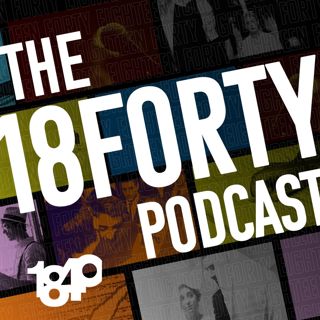
OTD Highlights
In this episode of the 18Forty Podcast, we sit down for a special session with our host, David Bashevkin, to discuss one of the podcast’s first topics: going off the derech. There are many preconceptions that come with leaving one’s religious life. People often claim to know the precise psychological reasons that caused someone to leave and what kind of life they’re currently living. There are always reasons, but these reasons can be varied and unexpected, and can lead people to very different places. Some don’t even think of themselves as having left, as they have found a different derech that works for them. -Why do people leave religion?-Where do people go instead?-What struggles do people experience in leaving their old communities?-How does the desire for community manifest in trying to build a new life?Tune in to hear David reflect on his conversations with past podcast guests about this phenomenon of leaving one’s religious community, or going OTD.References:Shulem Deen interview - http://18forty.org/otd/#deenPhilo Judaeus interview - http://18forty.org/otd/#judaeusKelsey Osgood interview - http://18forty.org/otd/#osgoodJudaism and the Twice-Born by Kelsey OsgoodAll Who Go Do Not Return by Shulem Deen For more, visit https://18forty.org/otd.Become a supporter of this podcast: https://www.spreaker.com/podcast/18forty-podcast--4344730/support.
26 Jan 202156min

Talmud Highlights
In this episode of the 18Forty Podcast, we sit down for a special podcast with our host, David Bashevkin, to review the first topic that 18Forty covered: Talmud. Though Judaism has many facets to its practice, Talmud study has long been one of its hallmarks. It is a sprawling text with many commentaries, and so can be analyzed from any number of perspectives. This episode highlight three: those of Ari Bergmann, Chaim Saiman, and Michelle Chesner. From its historical formation to its ideas to its format, the Talmud was analyzed at length for its 18Forty topic, and this episode highlights some of the key questions raised. -How was the Talmud written?-What should one make of the often confusing mix of ideas it presents?-Does the text format itself hold any significance?-Is Talmud study useful for anything besides Talmud study?-What similarities does it have to other fields of knowledge?Tune in to hear David review and reflect on his past conversations with podcast guests about the Talmud.References:Ari Bergmann interview - http://18forty.org/talmud/#bergmannChaim Saiman interview - http://18forty.org/talmud/#saimanMichelle Chesner interview - http://18forty.org/talmud/#chesnerTake One podcast - https://www.tabletmag.com/podcasts/take-oneLegal Theology: The Turn to Conceptualism in Nineteenth-Century Jewish Law by Chaim Saiman Nomos and Narrative by Robert CoverJewish Thought: A Process, Not a Text by David BashevkinArba-ah Turim by Jacob Ben AsherHalakhah: The Rabbinic Idea of Law by Chaim SaimanFor more, visit https://18forty.org/talmud/.Become a supporter of this podcast: https://www.spreaker.com/podcast/18forty-podcast--4344730/support.
19 Jan 20211h

Why 1840?
In this episode of the 18Forty Podcast, we sit down for a special podcast with our host, David Bashevkin, to discuss the podcast’s namesake, the year 1840. Though humanity’s history is long and rich, it’s only recently that the world has begun to look like we’re used to. From the renaissance to the scientific and industrial revolutions, technology and information seem to be progressing at an exponential rate. Judaism, along with all tradition, had to contend with modernity as we now know it for the first time. Most of modern Jewry has been affected in some way or another by this modernization of its members. -What historical significance does the year 1840 have?-What challenges did it bring for Judaism and other traditions?-How did Judaism respond to those challenges?-And in the end, how does modern Judaism differ from its other historical iterations?Tune in to hear David share why the year 1840 holds such significance for him, and how he feels its effects in his life.References:The Europeans Review - https://www.nytimes.com/2019/10/28/books/review/the-europeans-orlando-figes.htmlIsrael Bartal article - https://link.springer.com/article/10.1007/s10835-005-5978-7ZoharThe Europeans by Orlando FigesJewish Continuity in America - Abraham J. KarpZichron Yaakov by Rabbi Yaakov LipschutzSapiens by Yuval Harari For more, visit https://18forty.org/why-1840.Become a supporter of this podcast: https://www.spreaker.com/podcast/18forty-podcast--4344730/support.
12 Jan 202137min
![Eli Rubin: How do Mysticism and Social Action Interact? [Social Justice 3/3]](https://cdn.podme.com/podcast-images/D79089FBEF78B78B9B1A2A8AFD27F6A1_small.jpg)
Eli Rubin: How do Mysticism and Social Action Interact? [Social Justice 3/3]
In this episode of the 18Forty Podcast, we sit down with Eli Rubin – writer and researcher at chabad.org – to think about the stereotypes associated with social justice and vision, and how those seeming boundaries have been transcended. Social reform requires that one embrace at least some change, leading some to think that it is antithetical to conservative worldviews. While the compatibility of Judaism and social justice movements is not guaranteed, it is often the case, even in some of what are seen as the more right-wing parts of modern Judaism. The modern history of social justice involves figures ranging from Rabbi AJ Heschel to the Lubavitcher Rebbe, and challenges some common assumptions. -Has social justice been associated with mysticism and/or rationalism?-What might social justice, or tikkun olam, mean within Judaism?-What have various historical figures interpreted it to mean?-What association does the Lubavitcher Rebbe have with social justice?Tune in to hear Eli Rubin share his views on the historical relationship between social justice and the Torah.References:Social Vision: The Lubavitcher Rebbe's Transformative Paradigm for the World by Philip Wexler, Michael Wexler, and Eli RubinTo Heal the World? - Jonathan NeumannHasidism Beyond Modernity - Naftali Loewenthal For more, visit https://18forty.org/socialjustice/#rubin.Become a supporter of this podcast: https://www.spreaker.com/podcast/18forty-podcast--4344730/support.
5 Jan 20211h 9min
![Dr. Rivka Press Schwartz: How Should We Educate About Social Justice? [Social Justice 2/3]](https://cdn.podme.com/podcast-images/D79089FBEF78B78B9B1A2A8AFD27F6A1_small.jpg)
Dr. Rivka Press Schwartz: How Should We Educate About Social Justice? [Social Justice 2/3]
In this episode of the 18Forty Podcast, we sit down with Dr. Rivka Press Schwartz – Shalom Hartman Institute Fellow, SAR Associate Principal, and Princeton PhD – to think about ways in which social justice can be incorporated into Orthodox education systems. History has seen many hierarchical class systems that benefit some to the detriment of others. The Jewish people have not often been the beneficiaries, yet we enjoy much economic and social success in much of the world today. Dr. Press Schwartz thinks that while this success is in part due to our own willpower, certain fluke historical factors have played in our favor, giving us a leg up. She believes that the Torah is compatible with a social view that involves recognizing social privileges and attempting to mitigate them. -What is privilege?-How privileged have the Jewish people been throughout history?-What, if anything, should be done when privileges are identified?-What does the Torah have to say about this?Tune in to hear Dr. Rivka Press Schwartz share her views on the Torah, the Jewish people, privilege, and broader social justice.References:Dr. Press Schwartz article "Privilege, Perspective, and Modern Orthodox Youth" - https://18forty.org/wp-content/uploads/2020/12/privilege-perspective-press-schwartz.pdfDr. Press Schwartz and David Bashevkin Twitter Exchange - https://twitter.com/DBashIdeas/status/1283400224191504389Yuval Levin election day NYT op ed - https://www.nytimes.com/2020/11/03/opinion/2020-election.htmlA Time to Build by Yuval LevinThe Color of Law by Richard RothsteinFor more, visit https://18forty.org/socialjustice/#pressschwartz.Become a supporter of this podcast: https://www.spreaker.com/podcast/18forty-podcast--4344730/support.
29 Des 20201h 17min







